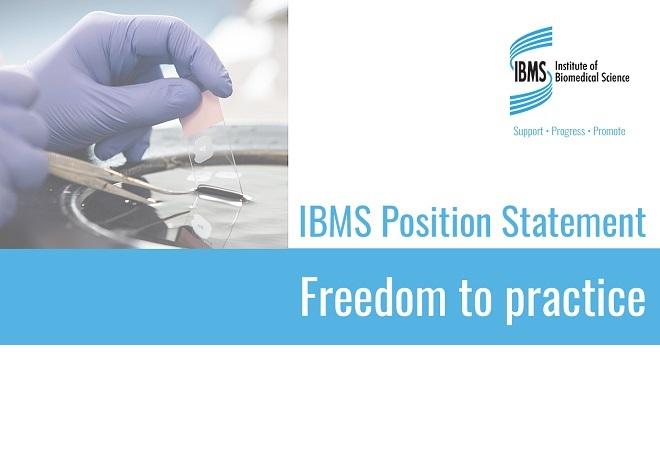Position Statement: freedom to practice

IBMS Council clarify the position of a biomedical scientist interpreting and reporting results, making a diagnosis or providing a clinical result
Biomedical scientists: freedom to practice
As biomedical scientists increasingly undertake advanced and consultant roles their scope of practice will change and develop considerably from their original point of registration.
The following information is provided for registrants and their employers to confirm that the training and use of biomedical scientists to undertake advanced roles, including those that are shared with medically qualified pathologists, is not in contravention of Health and Care Professions Council (HCPC) biomedical scientist standards of proficiency. It represents professional development and advancement of scope of practice, which is seen in many of the healthcare professions.
The HCPC regulates 16 separate professions; every registrant must meet the HCPC standards of proficiency in order to be admitted to the HCPC register and thereafter must meet the standards relevant to their scope of practice in order to remain on the register.
The HCPC standards of proficiency set out the threshold standards considered necessary to protect the public and include generic elements, which apply to all registrants, and profession-specific elements that are relevant to registrants belonging to one of the regulated professions.
The HCPC is very clear in its guidance to registrants; it recognises that a registrant’s scope of practice will change over time and may become more focused and specialised. This may mean that an individual may not be able to demonstrate that they meet all of the standards that apply to the whole of their profession throughout the entire duration of their career.
| “As long as a registrant is practising safely and effectively within their given scope of practice and does not practise in areas where they are not proficient to do so, it is not a problem.” |
The HCPC standards of proficiency do not present a barrier to advanced practice career development. They are permissive rather than exclusive. There are no specific exclusions, limits or restrictions to biomedical scientist practice. The only requirement is that registrants must practice safely and effectively within their given scope of practice.
As part of their current roles biomedical scientists interpret and report results. To emphasise, providing the HCPC standards of proficiency are being met there is no barrier to biomedical scientists interpreting and reporting results, making a diagnosis or providing clinical result interpretation, as part of advanced clinical or consultant roles, provided they are trained, assessed as competent and operating within documented departmental protocols. Specific standards can be referenced in relation to biomedical scientists performing these functions.
The following standards relate to autonomous practice and are applicable to the decision making associated with reporting and referring, performing diagnostic or monitoring tests and the evaluation of such tests to aid diagnoses.
| Standard 4: Registrant biomedical scientists must be able to practise as an autonomous professional, exercising their own professional judgement |
| Standard 13.9: A registrant biomedical scientist must be able to evaluate analyses using qualitative and quantitative methods to aid the diagnosis, screening and monitoring of health disorders |
| Standard 14.2: A registrant biomedical scientist must be able to conduct appropriate diagnostic or monitoring procedures, treatment or therapy or other actions safely and effectively |
The Institute’s professional qualifications set professionally recognised standards of best practice and assess individuals against those standards. They are available to members to support their professional development and to advance their scope of practice as part of evolving professional and service needs. For more information on the Institute’s qualifications please visit: our Qualifications webpage
Click here for more information on how you can request a position statement


